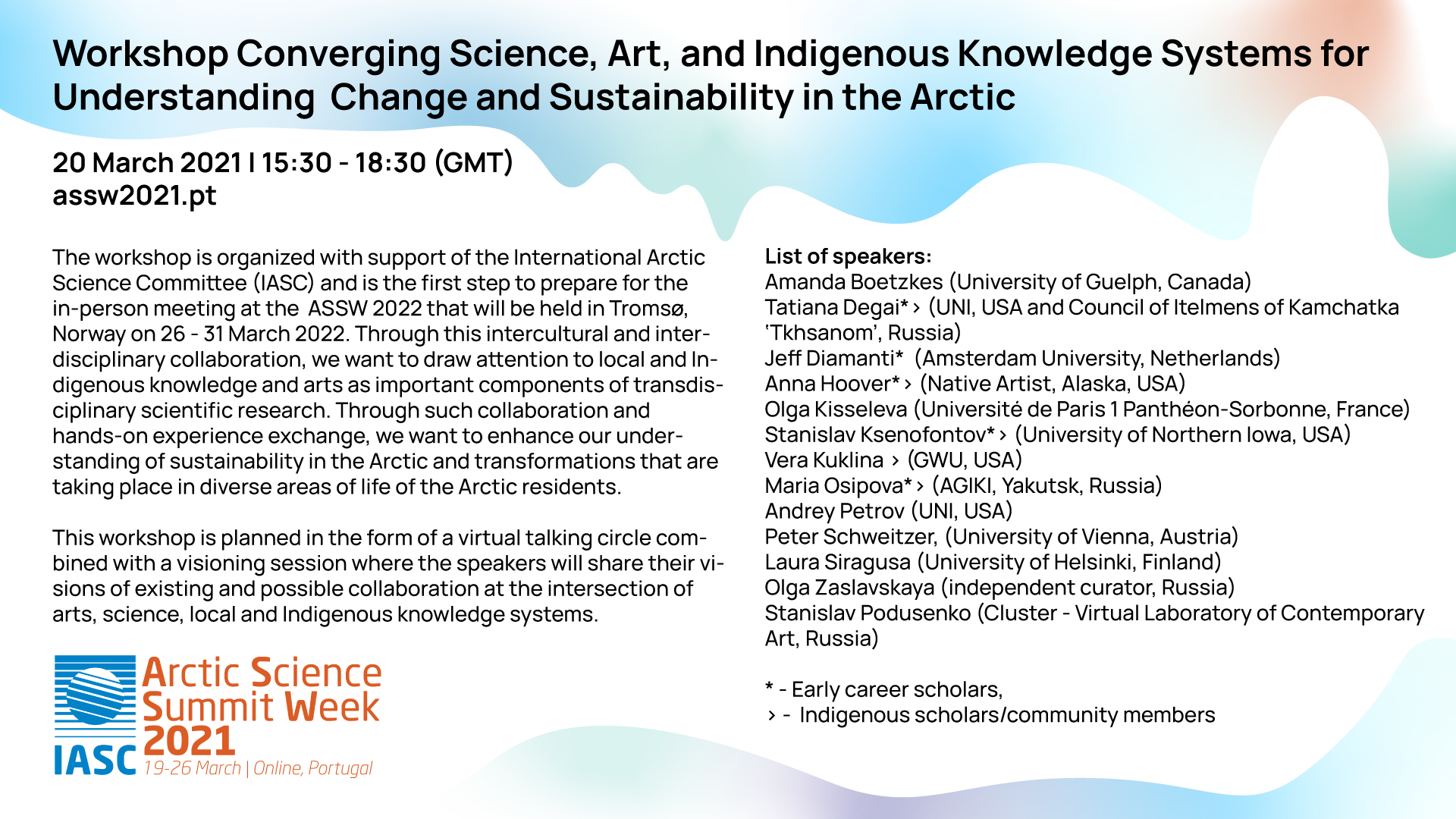Virtual Workshop Converging Science, Art, and Indigenous Knowledge Systems for Understanding Change and Sustainability in the Arctic at Arctic Science Summit Week (ASSW). Lissabon, Portugal, 19-26 March 2021
A group of twelve Arctic Indigenous and non-indigenous researchers (anthropologists, geographers, and humanities scholars) and artists participated in the virtual workshop to discuss sustainability issues in the Arctic by converging different sources of knowledge, practices, values, beliefs, and artistic interpretation, and to develop an agenda for in-person workshop and an exhibition at ASSW 2022 in Tromso in 2022. The meeting was held in the form of a virtual talking circle combined with a visioning session where the speakers shared their visions of existing and possible collaboration at the intersection of arts, science, local and Indigenous knowledge systems (ArtSLInK). The workshop became a place where we started conversation on ArtSLInK methodology and its application. Participants emphasized the need for cultural transformations and confluence of diverse sources of knowledge for understanding, responding and preparing for a more resilient future.
More
The workshop was organized by Vera Kuklina from the George Washington University (USA), Andrey Petrov from the University of Northern Iowa and Olga Zaslavskaya, independent researcher and curator from Russia. The workshop engaged participants of different ethnicities, career stages, knowledge backgrounds, and disciplines and different countries (Russia, USA, France, Finland, Canada, Netherlands). The workshop participants were either from the Indigenous communities themselves or have long-established relations with indigenous collaborators. Through this multi- and transdisciplinary collaboration, they discussed indigenous knowledge and arts as important grounds for understanding complexity and interconnectedness of the problems humanity is facing today.
The future collaboration is planned to support exploration of creative possibilities of art, science, local and Indigenous knowledge for understanding, interpreting, and presenting interdependencies and interrelations within Arctic social-ecological-technological systems (SETS). The results of the next workshop will be used to develop scientifically grounded, socially inclusive, culturally appropriate and creative approaches to sustainability transformations in the form of such projects as exhibitions, video installations and performances aiming to pave a way for broader discussions.
Program
Introduction:
- Olga Zaslavskaya (Cluster – Virtual Laboratory of Contemporary Art, Russia)
Part 1: Examining drivers of infrastructure change in the Arctic social-ecological systems
- Vera Kuklina (The George Washington University, USA),
- Peter Schweitzer (University of Vienna, Austria),
- Andrey Petrov (UNI, USA)
Part 2: Co-creating understandings of Arctic sustainability by researchers and local and Indigenous communities
- Laura Siragusa (University of Oulu, Finland)
- Stanislav Ksenofontov (University of Northern Iowa, USA)
- Maria Osipova (AGIKI, Yakutsk, Russia)
Q & A
Plan 3: Exploring creative possibilities of art, science, local and Indigenous knowledge.
- Anna Hoover (Native Artist, Alaska, USA)
- Jeff Diamanti (Amsterdam University, Netherlands)
- Tatiana Degai (UNI, USA and Council of Itelmens of Kamchatka ‘Tkhsanom’, Russia)
Part 4: Discussing collaborative scientific and artistic practices for knowledge co-production
- Amanda Boetzkes (University of Guelph, Canada)
- Оlga Kisseleva (Université de Paris 1 Panthéon-Sorbonne, France)
- Stanislav Podusenko (Cluster – Virtual Laboratory of Contemporary Art, Russia)
Q & A
Discussion

